#this is a creative writing prompt
Text
mash episodes i'd write if i was in charge:
klinger hosts a convention for guys trying to get out on a section 8 on the same day a general is visiting the 4077
hawkeye and sidney scrambling to make a seder plate out of army rations for passover
klinger holds a korean war themed met gala 20 years before the met gala had themes
you've heard of the episodes where the nurses are evacuated and the men have to cope without them now get ready for episode that follows the nurses when they evacuate
normal mash episode but everyone has bj's moustache. it's never mentioned.
bottle episode where shelling causes the main cast to be stuck in the OR and they go full lord of the flies
episode where bj is getting pranked relentlessly and he's the only one it's happening to in the camp, it's revealed at the end he was pranking himself and lying about it
#write in your own mash episodes you'd write if you were in charge i want to know#this is a creative writing prompt#m*a*s*h
2K notes
·
View notes
Text
a list of 100+ buildings to put in your fantasy town
academy
adventurer's guild
alchemist
apiary
apothecary
aquarium
armory
art gallery
bakery
bank
barber
barracks
bathhouse
blacksmith
boathouse
book store
bookbinder
botanical garden
brothel
butcher
carpenter
cartographer
casino
castle
cobbler
coffee shop
council chamber
court house
crypt for the noble family
dentist
distillery
docks
dovecot
dyer
embassy
farmer's market
fighting pit
fishmonger
fortune teller
gallows
gatehouse
general store
graveyard
greenhouses
guard post
guildhall
gymnasium
haberdashery
haunted house
hedge maze
herbalist
hospice
hospital
house for sale
inn
jail
jeweller
kindergarten
leatherworker
library
locksmith
mail courier
manor house
market
mayor's house
monastery
morgue
museum
music shop
observatory
orchard
orphanage
outhouse
paper maker
pawnshop
pet shop
potion shop
potter
printmaker
quest board
residence
restricted zone
sawmill
school
scribe
sewer entrance
sheriff's office
shrine
silversmith
spa
speakeasy
spice merchant
sports stadium
stables
street market
tailor
tannery
tavern
tax collector
tea house
temple
textile shop
theatre
thieves guild
thrift store
tinker's workshop
town crier post
town square
townhall
toy store
trinket shop
warehouse
watchtower
water mill
weaver
well
windmill
wishing well
wizard tower
#worldbuilding#setting prompts#writer resources#writing inspiration#writing prompts#scene settings#writing reference#writing ideas#prompt list#creative writing#writing community#writer prompts#writing tips#world#fantasy world#fantasy worldbuilding#high fantasy#world building#epic fantasy#writing fantasy
25K notes
·
View notes
Text
How to show emotions
Part V
How to show grief
a vacant look
slack facial expressions
shaky hands
trembling lips
swallowing
struggling to breathe
tears rolling down their cheeks
How to show fondness
smiling with their mouth and their eyes
softening their features
cannot keep their eyes off of the object of their fondness
sometimes pouting the lips a bit
reaching out, wanting to touch them
How to show envy
narrowing their eyes
rolling their eyes
raising their eyebrows
grinding their teeth
tightening jaw
chin poking out
pouting their lips
forced smiling
crossing arms
shifting their gaze
clenching their fists
tensing their muscles
then becoming restless/fidgeting
swallowing hard
stiffening
holding their breath
blinking rapidly
exhaling sharply
How to show regret
scrubbing a hand over the face
sighing heavily
downturned mouth
slightly bending over
shoulders hanging low
hands falling to the sides
a pained expression
heavy eyes
staring down at their feet
Part I + Part II + Part III + Part IV
If you like my blog and want to support me, you can buy me a coffee or become a member! And check out my Instagram! 🥰
#writeblr#writing prompts#how to show emotions#show not tell#creative writing#writing help#writers on tumblr#how to write#writing advice#writing tips
11K notes
·
View notes
Text
Pirate Terms and Phrases
-> Pirate Lingo
-> A Pirate's Glossary
Batten Down The Hatches - tie everything down and put stuff away for a coming storm.
Brig - a prison on a ship.
Bring a Spring Upon 'er - turn the ship in a different direction
Broadside - the most vulnerable angle of a ship that runs the length of the boat.
Cutlass - a thick, heavy and rather short sword blade.
Dance with Jack Ketch - to hang; death at the hands of the law (Jack Ketch was a famed English executioner).
Davy Jones's Locker - a mythical place at the bottom of the ocean where drowned sailors are said to go.
Dead Men Tell No Tales - the reason given for leaving no survivors.
Flogging - severe beating of a person.
Gangplank - removable ramp between the pier and ship.
Give No Quarter - show no mercy.
Jack - flag flown at the front of the ship to show nationality.
Jolly Roger - black pirate flag with a white skull and crossbones.
Keelhaul - a punishment where someone is dragged under the ship. They are cut by the planks and barnacles on the bottom of the ship.
Landlubber - an inexperienced or clumsy person who doesn't have any sailing skills.
Letters of Marque - government-issued letters allowing privateers the right to piracy of another ship during wartime.
Man-O-War - a pirate ship that is decked out and prepared for battle.
Maroon - to leave someone stranded on a. deserted island with no supplies, typically a punishment for any crew members who disrespected the captain.
Mutiny - a situation in which the crew chooses a new captain, sometimes by forcibly removing the old one.
No Prey, No Pay - a common pirate law that meant crew members were not paid, but rather received a share of whatever loot was taken.
Old Salt - experienced pirate or sailor.
Pillage - to steal/rob a place using violence.
Powder Monkeys - men that performed the most dangerous work on the ship. They were treated harshly, rarely paid, and were expendable.
Privateer - government-appointed pirates.
Run A Shot Across the Bow - fire a warning shot at another boat's Captain.
Scurvy - a disease caused by Vitamin C Deficiency.
Sea Legs - when a sailor adjusts his balance from riding on a boat for a long time.
Strike Colors - lower a ship's flag to indicate surrender.
Weigh Anchor and Hoist the Mizzen - an order to the crew to pull up the anchor and get the ship sailing.
If you like what I do and want to support me, please consider buying me a coffee! I also offer editing services and other writing advice on my Ko-fi! Become a member to receive exclusive content, early access, and prioritized writing prompt requests.
#creative writing#writeblr#pirate writing prompts#pirates#pirate au#glossary#pirate lingo#pirate terms and phrases#pirate language#pirate vocab#pirate vocabulary#victorian slang#how to talk like a pirate#how to write#writing tips#fiction writing#writing advice#writing help#writing resources
13K notes
·
View notes
Text
one of the best fics i've ever read, one that had me addicted to my phone and crying, wasn't even prose. it was a huge, casual, bullet-pointed outline with every detail of an au that the author never got around to writing in full. and it was amazing.
let this be a message to all you who want to write but can't do it "normally": write it! someone out there will eat it up. whether that be poetry, tiny drabbles, or bullet pointed list: your work is always worth it. your art (yes, art!) will alway deserve to have its moment in the spotlight. why? because you made it. even if it wasn't done in a traditional matter, it came from your brain and your creativity and that is amazing.
♡
#writing inspiration#writing inspo#fanfiction#ao3#fanfic#fiction#writeblr#writing#alternate universe#writing prompts#art#creativity#creative writing
20K notes
·
View notes
Text
subtle ways to include foreshadowing
one character knowing something offhandedly that they shouldn't, isn't addressed until later
the crow rhyme
colours!! esp if like, blue is evil in your world and the mc's best friend is always noted to wear blue...betrayal?
write with the ending in mind
use patterns from tragic past events to warn of the future
keep the characters distracted! run it in the background until the grand reveal
WEATHER.
do some research into Chekhov's gun
mention something that the mc dismisses over and over
KEEP TRACK OF WHAT YOU PUT. don't leave things hanging.
unreliable characters giving information that turn out to be true
flowers and names with meanings
anything with meanings actually
metaphors. if one character describes another as "a real demon" and the other turns out to be the bad guy, you're kind of like...ohhh yeahhh
anyways add anything else in the tags
#foreshadowing#writing tips#lyralit#writing#writing prompts#writerblr#writing blog#prompt list#foreshadow#writers#writblr#writers block#writing ideas#creative writing
43K notes
·
View notes
Text
Poison list
While it's important to approach writing with creativity and imagination, it's crucial to prioritize responsible and ethical storytelling. That being said, if you're looking for information on poisons for the purpose of writing fiction, it's essential to handle the subject matter with care and accuracy. Here is a list of some common poisons that you can use in your stories:
Hemlock: Hemlock is a highly poisonous plant that has been used as a poison in various works of literature. It can cause paralysis and respiratory failure.
Arsenic: Arsenic is a toxic element that has been historically used as a poison. It can be lethal in high doses and can cause symptoms such as vomiting, abdominal pain, and organ failure.
Cyanide: Cyanide is a fast-acting poison that affects the body's ability to use oxygen. It can cause rapid loss of consciousness and cardiac arrest.
Nightshade: Nightshade plants, such as Belladonna or Deadly Nightshade, contain toxic compounds that can cause hallucinations, respiratory distress, blurred vision, dizziness, an increased heart rate, and even death when ingested.
Ricin: Ricin is a potent poison derived from the castor bean plant. It can cause organ failure and has been used as a plot device in various fictional works.
Strychnine: Strychnine is a highly toxic alkaloid that affects the nervous system, leading to muscle spasms, convulsions, and respiratory failure.
Snake Venom: Various snake venoms can be used in fiction as deadly poisons. Different snake species have different types of venom, each with its own effects on the body.
Digitalis: Digitalis, derived from the foxglove plant, contains cardiac glycosides. It has been historically used to treat heart conditions, but in high doses, it can be toxic. Overdosing on digitalis can cause irregular heart rhythms, nausea, vomiting, and visual disturbances.
Lead: Lead poisoning, often resulting from the ingestion or inhalation of lead-based substances, has been a concern throughout history. Lead is a heavy metal that can affect the nervous system, leading to symptoms such as abdominal pain, cognitive impairment, anemia, and developmental issues, particularly in children.
Mercury: Mercury is a toxic heavy metal that has been used in various forms throughout history. Ingesting or inhaling mercury vapors can lead to mercury poisoning, causing symptoms like neurological impairment, kidney damage, respiratory issues, and gastrointestinal problems.
Aconite: Also known as Wolfsbane or Monkshood, aconite is a highly toxic plant. Its roots and leaves contain aconitine alkaloids, which can affect the heart and nervous system. Ingesting aconite can lead to symptoms like numbness, tingling, paralysis, cardiac arrhythmias, and respiratory failure.
Thallium: Thallium is a toxic heavy metal that can cause severe poisoning. It has been used as a poison due to its tastelessness and ability to mimic other substances. Thallium poisoning can lead to symptoms like hair loss, neurological issues, gastrointestinal disturbances, and damage to the kidneys and liver.
When incorporating poisons into your writing, it is essential to research and accurately portray the effects and symptoms associated with them. Additionally, be mindful of the potential impact your writing may have on readers and the importance of providing appropriate context and warnings if necessary.
If you want to read more posts about writing, please click here and give me a follow!

#creative writing#writing#writeblr#writerscommunity#writer things#writers#writersociety#on writing#writers on tumblr#writblr#writings#writer#words#write#writers and poets#writing stuff#writing tools#writing prompt#writing community#writing inspiration#writing tips#writing advice#poison type#literature#belladonna
20K notes
·
View notes
Note
how do you write a liar?
How to Write Liars Believably
Language
The motive of every goal is the make the lie seem plausible while taking blame off the speaker, so liars will often project what they say to a third party: "Katie said that..."
Referring to third parties as "they" rather than he or she
In the case of a deliberate lie prepped beforehand, there will be an overuse of specific names (rather than pronouns) as the speaker tries to get the details right.
Overuse of non-committal words like "something may have happened"
Masking or obscuring facts like "to the best of my knowledge" and “it is extremely unlikely," etc.
Avoiding answers to specific, pressing questions
Voice
There's isn't a set tone/speed/style of speaking, but your character's speech patten will differ from his normal one.
People tend to speak faster when they're nervous and are not used to lying.
Body Language
Covering their mouth
Constantly touching their nose
fidgeting, squirming or breaking eye contact
turning away, blinking faster, or clutching a comfort object like a cushion as they speak
nostril flaring, rapid shallow breathing or slow deep breaths, lip biting, contracting, sitting on your hands, or drumming your fingers.
Highly-trained liars have mastered the art of compensation by freezing their bodies and looking at you straight in the eye.
Trained liars can also be experts in the art of looking relaxed. They sit back, put their feet up on the table and hands behind their head.
For deliberate lies, the character may even carefully control his body language, as though his is actually putting on a show
The Four Types of Liars
Deceitful: those who lie to others about facts
2. Delusional: those who lie to themselves about facts
3. Duplicitious: those who lie to others about their values
Lying about values can be even more corrosive to relationships than lying about facts.
4. Demoralized: those who lie to themselves about their values
Additional Notes
Genuine smiles or laughs are hard to fake
Exaggerations of words (that would normally not be emphasized) or exaggerated body language
Many savvy detectives ask suspects to tell the story in reverse or non-linear fashion to expose a lie. They often ask unexpected, or seemingly irrelevant questions to throw suspects off track.
#writers block#writing#writers and poets#creative writing#writers on tumblr#creative writers#helping writers#let's write#poets and writers#writeblr#resources for writers#writers of tumblr#writers life#writers community#writerscommunity#writer things#writing practice#writing prompt#writing community#writing inspiration#writing advice#writing tips#on writing#writer#writing questions#writing quotes#writing problems#writing process#writing progress
4K notes
·
View notes
Text


Show, don't tell : Part 1
Directory Writing Masterlist Blog Etiquette Buy me a Ko-Fi?

[ Angry + Frustrated ]
Red face
Tensing up jaw/body
Clenching fists
Gritting teeth
Stomped feet
Rolling eyes
Crossing arms
Kick/Hit something
Eyebrows furl
Face crunches up
Tight lips
Narrow eyes

[ Happy + Excited ]
Laugh/Giggle
Smile from ear to ear
High tone in voice
Smiling/Grinning while talking
Heart Pounding
Clapping
Breathing deeply
Squeal/Scream
Talking fast
Contentedly Sigh
Tilted head
Hand clasped over mouth

[Bored + Tired ]
Pace back and forth
Sigh loudly
Blank face
Play with fingers
Staring off into space
Yawning
Fidgeting around
Leaning head on hands
Rubbing eyes
Droopy eyes
Dark circles under eyes
Complaining

[Sad + Scared]
Trembling lips/body
Tears in eyes
Bite Nails
Curl up/tuck knees to chest
Bite nails
Eyes burn/turn red
Stop breathing OR breathe fast
Lose appetite
Frowning
Darting eyes
Blinking quick or not at all
Pounding heart

© ModifiedUchiha 2023 ★ Feel free to use them for inspiration , but give credit if adding to a list ★
#writing resources#writerblr#writing prompts#prompt list#writeblr#writing ideas#otp prompts#otp prompt challenge#creative prompts#creative prompts for writing#sentence starters#sentence starter prompt#writerscommunity#writers on ao3#writers on tumblr#angst prompts#mixed emotions#mixed emotion prompts#writing tips#creative writing#writer block#writing help#writing advice#writing tools#writing tips and tricks#show don't tell#writing inspiration#writing characters#writing challenge
10K notes
·
View notes
Text
Random + angst prompts:
By @me-writes-prompts
Yearning prompts
Character A gets hurt/injured ft. Character B’s feral response
Situationship prompts
Reuniting angst prompt
“What are we?” Prompts
Ghost x vampire prompts
More ghost x vampire prompts
Close proximity prompts
Crush prompts
Navigating through new relationship prompts
"Please don't leave me" prompts
Lovers in "denial" prompts
Reunited lovers prompts
Grumpy x sunshine prompts
"You're too good for me" prompts
"I think...I'm in love with you" prompts
Fake dating prompts
Betrayal prompts
"What would I do without you" prompts
Roommates to lovers prompts
Ice cream prompts
Underrated trope list
First date prompts
Oblivious x pining prompts
Break up prompts
Marriage of convenience prompts
Jealously prompts
OTP bonding with their children prompts
Secret relationship between two boys prompts
Denial of feelings prompts
Internalized homophobia prompts
Sunshine vampire x grumpy human prompts
Party game prompts
Family fluff prompts
Hero/warrior prompts
Lovers to friends prompts
Childhood friends prompts
Self-esteem issue prompts for your ocs
Nervous/awkward couple prompts
Forced proximity but one of them is claustrophobic prompts
#writers on tumblr#writeblr#prompt list#otp prompts#writing prompts#imagine your otp#otp#me-writes-prompts#master list#prompts#writing#ao3#fanfic prompts#writer prompts#writing prompt#creative writing#angst prompts#angst#story prompt#dialogue prompts#writing inspiration#otp meme#writing advice#writing tips
8K notes
·
View notes
Text
Some Quick Character Tips
Here are a handful of quick tips to help you write believable characters!
1. A character’s arc doesn’t need to grow linearly. Your protagonist doesn’t have to go from being weak to strong, shy to confident, or novice to professional in one straight line. It’s more realistic if they mess up their progress on the way and even decline a bit before reaching their goal.
2. Their past affects their present. Make their backstory matter by having their past events shape them into who they are. Growing up with strict parents might lead to a sneaky character, and a bad car accident might leave them fearful of driving.
3. Give reoccurring side characters something that makes them easily recognizable. This could be a scar, a unique hairstyle, an accent, or a location they’re always found at, etc.
4. Make sure their dialogue matches their personality. To make your characters more believable in conversation, give them speech patterns. Does the shy character mumble too low for anyone to ever hear, does the nervous one pace around and make everyone else on edge?
5. Make your characters unpredictable. Real people do unexpected things all the time, and this can make life more exciting. The strict, straight-A student who decides to drink at a party. The pristine princess who likes to visit the muddy farm animals. When character’s decide to do things spontaneously or in the heat of the moment, it can create amazing twists and turns.
6. Give even your minor character's a motive. This isn’t to say that all your characters need deep, intricate motives. However, every character should need or want something, and their actions should reflect that. What’s the motive behind a side character who follows your protagonist on their adventure? Perhaps they’ve always had dreams of leaving their small village or they want to protect your protagonist because of secret feelings.
Instagram: coffeebeanwriting
#writing tips and tricks#writing tips#writing advice#creative writing#writeblr#writing blog#how to write#writing help#writing fiction#writing prompts#fantasy writing#authortips#authoradvice#writingtips#writingmemes#writers blog#writingblog#authorsblog#howtowrite#writingtipsandtricks#writerscommunity#writers community#writinghelp#writingprompts#writertips#howtowriteascene#writingfiction#fictionwriting#fantasywriting#writing memes
23K notes
·
View notes
Text
50 WORDS TO USE INSTEAD OF “SAID”
Do you ever find yourself over-using the word “said” in your writing? Try using these words/phrases instead:
stated
commented
declared
spoke
responded
voiced
noted
uttered
iterated
explained
remarked
acknowledged
mentioned
announced
shouted
expressed
articulated
exclaimed
proclaimed
whispered
babbled
observed
deadpanned
joked
hinted
informed
coaxed
offered
cried
affirmed
vocalized
laughed
ordered
suggested
admitted
verbalized
indicated
confirmed
apologized
muttered
proposed
chatted
lied
rambled
talked
pointed out
blurted out
chimed in
brought up
wondered aloud
(NOTE: Keep in mind that all of these words have slightly different meanings and are associated with different emotions/scenarios.)
#words to use instead of#said#words#writing prompt#prompt#writing#prompts#writing prompts#creative writing#writing advice#verbs#verb#word#synonym#synonyms#writing tip#writing tips#writing help#word choice#writer
64K notes
·
View notes
Text
free resources to write a novel in 2024
hello hello! it's me, rach!
as the new year approaches, many of us set goals and resolutions - myself included. one of my goals for 2024 is to write a novel (I've been procrastinating on this for quite a long time now). i assume that some of you might have the same goal, that's why I'm writing this post today.
over 2023 i've been releasing some freebies for authors just like me, so I thought I could compile my favorites in this post. hope you find this useful :)
1) the writer's workbook
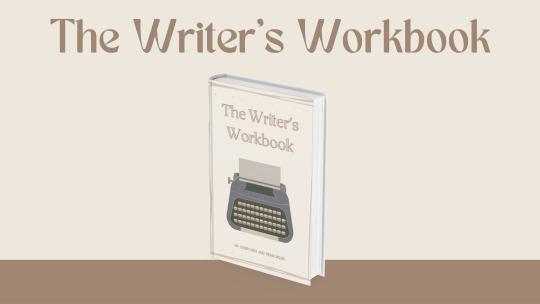
this workbook has over 60 exercises to help you develop characters, scenarios, etc. if you're ever stuck, I'm pretty sure this workbook will be your best friend.
2) author's corner (notion template)
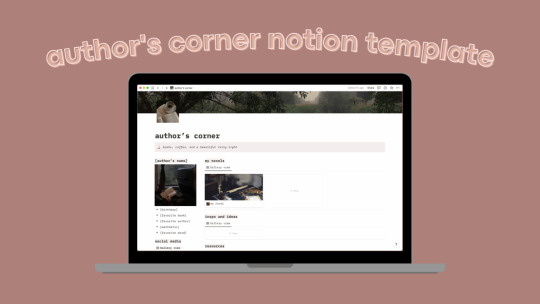
this is the most downloaded freebie in my shop! it is a notion dashboard with everything you need to organize your writing and has some templates included (like scrivener)!!
3) another notion template
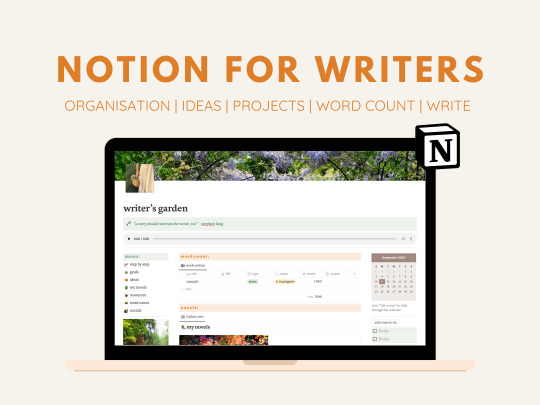
this one has two themes you can choose from: cottage-core and dark academia. they're very similar to the previous template, but this one is more recent and I added some new features. feel free to explore both and pick the one you like the most.
4) the author's journal
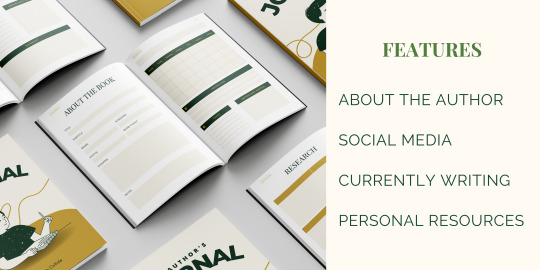
this is a cute printable with 20 pages that will help you stay on track and manage your social media accounts as a writer who shares their work online. you can also register what you're currently writing and your personal research and resources.
5) plan your book printable
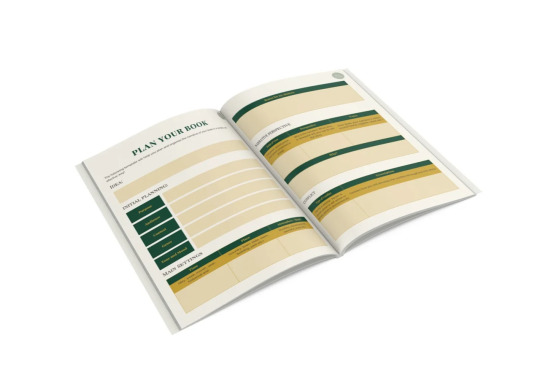
this is a 6-page printable for you to fill out and plan your book easily and effectively.
6) excel sheet to organize tasks & word-count

this is a simple excel sheet, but it is very effective for keeping track of your tasks & word-count of your novels. also, it is 100% customizable to your liking!
that's all for now! feel free to explore my gumroad shop where I have plenty of freebies to grab! also, don't forget to subscribe so that you never miss any opportunity to get a goodie for free :)
hope this post was useful!
have a nice day,
rach
#writing resources#writing#writeblr#writer tips#writing advice#writing help#writing tips#poetsandwriters#resources#research#wattpad#nanowrimo#creative writing#writerscommunity#writers#writing inspiration#writing prompts#writing reference#writerslife#writersofinstagram#software#inspiration#writing inspo#for writing#for writers#for whoever needs it#writing research#researching#we love an useful post#useful
3K notes
·
View notes
Text
powerful.
"Oh."
"Look at me."
"Please.
"Good boy."
"Don't follow me."
"Find me."
"I forgive you."
"Help me."
"No."
"Don't say that."
"Talk about it?"
"Forget me."
"Remember me."
"It's not over."
"Don't ignore me."
"Stay with me."
"I want to believe you."
"For you, always."
"Just... don't."
"There is no us."
"I don't need you."
"Leave me behind."
"Don't bother."
"Fear me."
"Break me."
"I don't care."
"This isn't the end."
"Please hold me."
"I'm right here."
"Wait for me."
"Kiss me."
"Ohh."
#writeblr#writers on tumblr#writing prompts#writing community#writing#creative writing#writing ideas
7K notes
·
View notes
Note
I don't know if you've done this before but what are some good ways to describe speech?
Ways to Describe Speech
-> feel free to edit and adjust pronouns as you see fit.
His voice was deep like the rumbling of the earth.
She had the voice of a singer, smooth and rich like chocolate.
Their voice reminded him of spring rain.
He often paused in his speaking, like a car radio that had lost signal.
She had a lilt to her voice that made it seem like she was asking a question.
Their voice was monotonous, threatening to put her to sleep with every word.
He couldn't put her voice into words. It was... otherworldly.
Her voice was brittle, as if she were on the verge of tears.
Their voice was authoritative. Their words carried like a loud command.
His voice, unapologetic and unwavering, made her shrink back.
Her voice was barely above a whisper.
Their words were cold with anger.
Other Words to Use to Describe Voice:
Firm
Formal
Frank
Hesitant
Humorous
Passionate
Playful
Professional
Respectful
Serious
Sympathetic
Smug
Superior
Croaky
Dry
Forceful
Grating
Hateful
Insincere
Nasally
Snarky
Tuneless
Wavering
Breaking
Coarse
Flat
Hoarse
High Pitched
Husky
Mellow
Raspy
Rough
Scratchy
Strong
Trembling
Boisterous
Booming
Screeching
Faint
Feeble
Frail
Penetrating
Piercing
Quiet
Raised
Shrill
Soft
Weak
Whisper
Captivating
Deep
Feathery
Hypnotic
Lilting
Mesmerizing
Rich
Smoky
Soothing
Breathy
Delicate
Warbling
If you like what I do and want to support me, please consider donating! I also offer editing services and other writing advice on my Ko-fi!
#writing prompts#creative writing#writeblr#prompt list#ask box prompts#how to describe speech#how to describe voice#how to write#writing help#writing inspiration#writing tip#writing ideas
6K notes
·
View notes
Text
Writing Rage: How To Make Your Characters Seem Angry
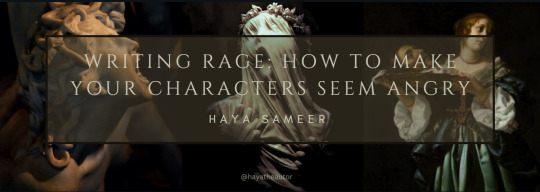
Anger is a powerful emotion that can add depth and intensity to your character's personality. If you're facing issues realistically expressing your characters' rage, here are some quick tips to help you get the ball rolling. Whether your character is seething with quiet rage or exploding in a fit of fury, these tips will help you convey their emotions vividly to your readers.
This is blog one in my writing different emotions series. Go check it out to explore more emotions!
Facial Expressions
Furrowed Brows: Describe the deep lines between their eyebrows, signaling frustration or intensity.
Tightened Jaw: Mention their clenched jaw, indicating suppressed anger or tension.
Narrowed Eyes: Highlight how their eyes narrow, showing suspicion, irritation, or anger.
Raised Upper Lip: Note the slight curl of the lip, suggesting disdain or contempt.
Flared Nostrils: Describe how their nostrils flare, indicating heightened emotions like anger or aggression.
Body Language and Gestures
Crossed Arms: Show their defensive stance, portraying resistance or defiance.
Pointing Finger: Describe them pointing accusatively, conveying aggression or assertion.
Fist Clenching: Mention their clenched fists, symbolizing anger or readiness for confrontation.
Hand Gestures: Detail specific hand movements like chopping motions, indicating frustration or emphasis.
Aggressive Posturing: Describe them leaning forward, invading personal space to intimidate or assert dominance.
Posture
Tense Shoulders: Highlight their raised or tense shoulders, indicating stress or readiness for conflict.
Upright Stance: Describe their rigid posture, showing control or a desire to appear strong.
Stiff Movements: Mention their jerky or abrupt movements, reflecting agitation or impatience.
Eye Contact
Intense Stares: Describe their intense or prolonged gaze, signaling confrontation or challenge.
Avoiding Eye Contact: Note how they avoid eye contact, suggesting discomfort or a desire to disengage.
Glaring: Mention how they glare at others, conveying hostility or disapproval.
Dialogue
Raised or strained tone with variations in pitch reflects heightened emotions.
Short, clipped sentences or abrupt pauses convey controlled anger.
Use of profanity or harsh language intensifies verbal expressions of anger.
Volume increase, from whispers to shouts, mirrors escalating anger levels.
Monotonous or sarcastic tone adds layers to angry dialogue.
Interruptions or talking over others signify impatience and frustration.
Aggressive verbal cues like "I can't believe..." or "How dare you..." express anger explicitly.
Reactions
Physical Reactions: Detail physical responses like increased heart rate, sweating, or trembling, showing emotional arousal.
Defensive Maneuvers: Describe how they react defensively if someone tries to touch or talk to them, such as stepping back or raising a hand to ward off contact.
Object Interaction
Aggressive Handling: Show them slamming objects, throwing things, or gripping items tightly, reflecting anger or aggression.
Use of Props: Mention how they use objects to emphasize their emotions, like slamming a door or clenching a pen.
Descriptive Words:
Verbs:
Roared with fury, expressing unbridled anger.
Snapped in frustration, indicating sudden irritation.
Shouted angrily, releasing pent-up emotions.
Glared fiercely, showing intense displeasure.
Slammed objects in rage, symbolizing anger's physical manifestation.
Grunted in annoyance, displaying impatience.
Raged vehemently, portraying uncontrolled anger.
Adjectives:
Furious and incensed, conveying intense anger.
Seething with rage, bubbling beneath the surface.
Livid and fuming, exhibiting visible anger.
Agitated and irritated, showing growing impatience.
Enraged and wrathful, expressing extreme anger.
Vexed and irate, indicating annoyance.
Infuriated and incandescent, highlighting explosive anger.
Looking For More Writing Tips And Tricks?
Are you an author looking for writing tips and tricks to better your manuscript? Or do you want to learn about how to get a literary agent, get published and properly market your book? Consider checking out the rest of Haya’s book blog where I post writing and publishing tips for authors every Monday and Thursday! And don’t forget to head over to my TikTok and Instagram profiles @hayatheauthor to learn more about my WIP and writing journey!
#hayatheauthor#haya sameer#haya's book blog#haya blogs#blog masterlist#writing community#writing tools#writer things#writing advice#writer community#writing techniques#writing prompt#writing stuff#creative writing#ya writing advice#writing tips and tricks#writer tools#writers of tumblr#writer blog#writers block#writers on tumblr#writerscommunity#writer stuff#author help#author advice#writing emotions#how to write emotions#emotional writing#writing#author
2K notes
·
View notes